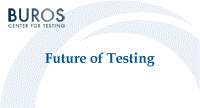Buros-Nebraska Series on Measurement and Testing

The Future of Testing
Date of this Version
1986
Document Type
Article
Citation
Published in The Future of Testing, edited by Barbara S. Plake & Joseph C. Witt (Hillsdale, NJ: Lawrence Erlbaum Associates, 1986).
Abstract
There will be no divining of the future here- no megatrends, no reference to Orwell (except this one). What little we truly know about the future does not bear mentioning. Nor shall I refer to micro-computers, data banks, and other gaudy paraphernalia that the future holds for us. The future is best seen in a rear-view mirror. We can at least hope to see more clearly the recent past we have traversed. Appearances of rapid change are usually superficial. If we see the past and present clearly, we will know as much of our future as it is ever permitted us to know.
Kenneth Boulding (1968) contends that the discovery of knowledge is absolutely unpredictable, since knowledge is the one thing that if we could predict when we would discover it we would have it already. The evolution of a technology, if it were not really radically new, might be predicted with some success; but then, if we can't predict the discovery of new knowledge and we can only predict changes in ordinary technology, then surely we have little idea of the important changes that lie ahead. New knowledge is revolutionary; technology is Establishment. The discovery of knowledge upsets things, changes the way lives are led. Technology serves old entrenched interests and established institutions. The glacial evolution of testing in this century reveals the source of its momentum- new technologies are moving it, not new knowledge. Testing is the conservative wing of the Social Science party.
A Point of View: Abstracted Empiricism
The most revealing perspective to assume for viewing the evolution and the current condition of testing is that which affords the clearest picture of how testing relates to the basic disciplines in the study of human behavior. In the last 100 years, testing has moved gradually from the center to the periphery of the behavioral and social sciences. Once an integral part of the best thinking on human development and behavior, testing' has progressively grown more inbred and dissociated from the leading theoretical positions in psychology and the social sciences. In its position at the margin, testing has come to serve more faithfully the goals of its own professional subculture and of a particular political subculture (i.e., its own intellectual Establishment and the professional-managerial Establishment) than to serve the ends of science and the true aims of education. To fulfill its promise, testing must find its way back to the center of psychological thinking.
My message here does little more than echo a theme sounded by Anne Anastasi (1967) in her 1966 presidential address to Division 5 of the American Psychological Association.
. . . Psychological testing is becoming dissociated from the mainstream of contemporary psychology. Those psychologists specializing in psychometrics have been devoting more and more of their efforts to refining the techniques of test construction, while losing sight of the behavior they set out to measure. Psychological testing today places too much emphasis on testing and too little on psychology. As a result, outdated interpretations of test performance may remain insulated from the impact of subsequent behavior research. It is my contention that the isolation of psychometrics from other relevant areas of psychology is one of the conditions that have led to the prevalent public hostility toward testing (p. 297). Although the very essence of psychological testing is the measurement of behavior, testing today is not adequately assimilating relevant developments from the science of behavior. ... It is noteworthy that the term “test theory" generally refers to the mechanics of test construction, such as the nature of the score scale and the procedures for assessing reliability and validity. The term does not customarily refer to psychological theory about the behavior under consideration. Psychometricians appear to shed much of their psychological knowledge as they concentrate upon the minutiae of elegant statistical techniques. Moreover, when other types of psychologists use standardized tests in their work, they too show a tendency to slip down several notches in psychological sophistication (p. 300).


Comments
Copyright © 1986 by Lawrence Erlbaum Associates. Digital edition copyright © 2012 Buros Center for Testing. This book may be downloaded, saved, and printed by an individual for their own use. No part of this book may be re-published, re-posted, or redistributed without written permission of the holder of copyright.